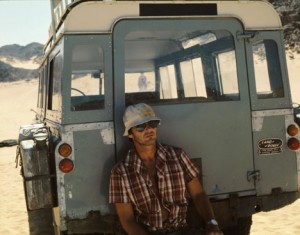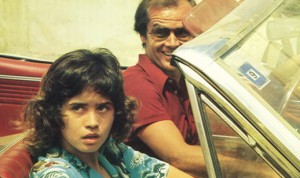An existential thriller set in languid deserts and brisk airports, Michelangelo Antonioni’s drama quietly and gradually stalks the truth, right down to its pitch-perfect, remarkably understated conclusion, which is one of the most analyzed scenes in film history. An afterthought when it was released, The Passenger is now rightly recognized as one of the masterworks of the ’70s.
Journalist David Locke (Jack Nicholson) finds himself deep in the Sahara desert wrapping up a documentary about a revolution whose horrors he can barely begin to fathom. Complicating matters are his own personal demons, which seem equally inscrutable. All Locke knows is that he wants out of his life, that he desires to throw away the baggage of all that he’s become. The reporter gets the opportunity when an acquaintance named Robertson, who is staying at the same dusty, no-star hotel, dies suddenly, presumably from a heart attack. Their ages and faces are similar, so Locke switches places; he’s the one who is announced as deceased and he’s reborn as Robertson.
 But a second act can be tricky and not just because it soon becomes clear that Robertson was dealing arms to a band of rebels. While Locke knows he has no way of fulfilling his end of the munitions contract, which could imperil his life, he has another problem: Freedom from his old self makes Locke realize that angst and anxiety weren’t particular to just him. He dutifully follows Robertson’s agenda book and is diverted, if briefly, in Munich where the erstwhile journalist meets an architecture history student (Maria Schneider) who’s willing to impetuously go along with him on his road to nowhere.
But a second act can be tricky and not just because it soon becomes clear that Robertson was dealing arms to a band of rebels. While Locke knows he has no way of fulfilling his end of the munitions contract, which could imperil his life, he has another problem: Freedom from his old self makes Locke realize that angst and anxiety weren’t particular to just him. He dutifully follows Robertson’s agenda book and is diverted, if briefly, in Munich where the erstwhile journalist meets an architecture history student (Maria Schneider) who’s willing to impetuously go along with him on his road to nowhere.
Pursued from city to city by an ever-growing cabal of people who want to meet the mysterious Robertson, Locke, who had hoped to become nothingness, instead has only multiplied his being. In one scene, Locke’s automobile breaks down in the middle of the desert and he screams furiously at the universe, “Alriiiight!” signaling his defeat. As if the outcome was ever in doubt.•
Tags: Jack Nicholson, Maria Schneider, Michelangelo Antonioni

